2002: When dodgy decisions took South Korea to the semis – and infuriated Europe's big guns
Senegal set the tone from the off, but it was South Korea's miraculous run to the final four that really caused a stir, writes Nick Harper
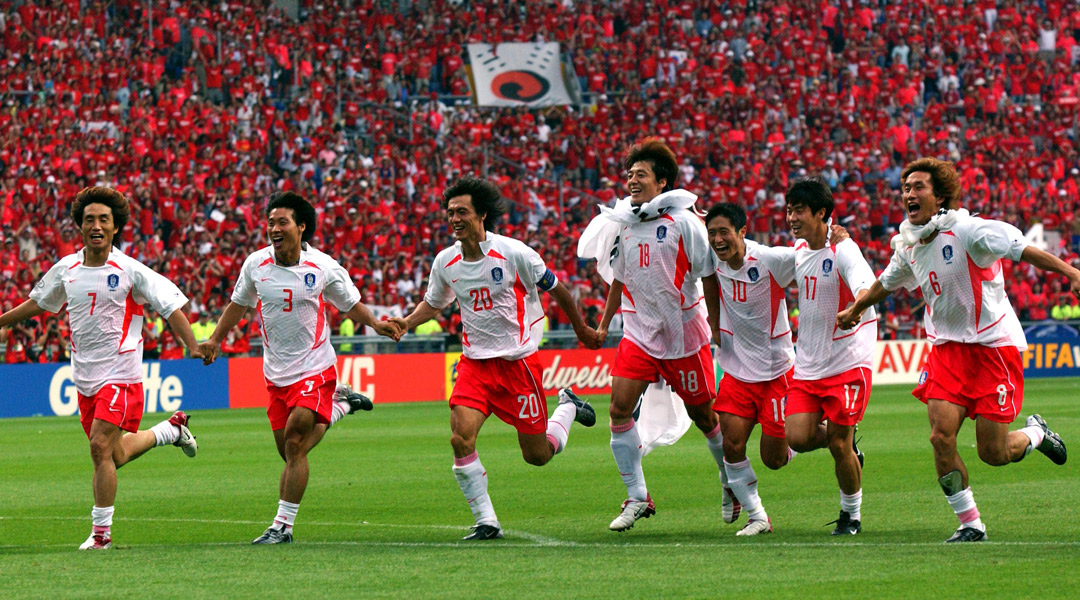
Twenty-nine minutes and 15 seconds. It took less than half an hour of the 2002 World Cup finals for the world to realise something odd was afoot. Less than 30 minutes into the opening game between defending world and European champions France and a supposedly sacrificial Senegal, a giant African we'd never heard of bundled the only goal past Fabien Barthez from all of five inches. As he did so, the tone for the 17th finals was set.
As shocks go, France 0-1 Senegal was only a seven out of 10. Solid, but not so spectacular. After all, the Lions of Teranga had topped their qualifying group, and any good revisionist will tell you that France had peaked two years earlier (as illustrated by the fact they would finish bottom of Group A with a single point and no goals). But it was still unexpected and entirely in keeping with the tournament that was about to unfold. For the impartial observer, the upsets came at a very pleasing pace.
The USA's spirited 3-2 victory over Portugal in their opening group game; Italy's sloppy 2-1 defeat to Croatia, in which they had two decent goals chalked off (more of which later); even, a cynic might add, England's largely unexpected 1-0 victory over Argentina that helped eliminate the South Americans at the first jump. Few sane spectators saw any of those results coming.
Nor Japan's 1-0 victory over Russia in Yokohama, or nine-man Portugal's 1-0 defeat to the other co-hosts, South Korea, which saw them eliminated when even a draw would have scraped them through.
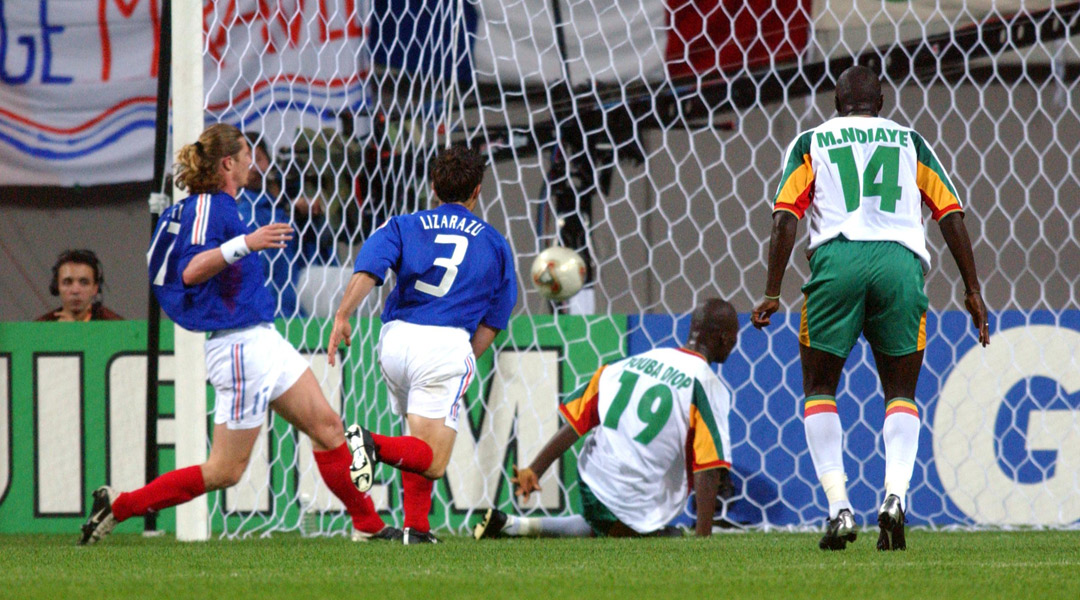
At this stage, it was all entertainingly eccentric. And while we'd witnessed nothing to trouble Mr Richter and his trusty scale as yet, the seismic shocks were lurking just around the corner. In the last 16, Senegal continued where they'd begun, knocking Sweden out with a 2-1 win in extra time, while the USA's 2-0 victory over Mexico wasn't entirely expected.
Turkey sullied the script with a 1-0 win over Japan, but the other co-hosts, those South Koreans, more than compensated by engineering one of the most unexpected upsets since their dear neighbours North Korea did for Italy at Ayresome Park in 1966. One of the most unexpected – and indeed one of the most questionable.
Angering the Azzurri
Get FourFourTwo Newsletter
The best features, fun and footballing quizzes, straight to your inbox every week.
On paper, Italy-South Korea was a mismatch. This was a potent Azzurri – an Italy with Alessandro Del Piero, Christian Vieri, Francesco Totti and Pippo Inzaghi all at the peak of their attacking powers; Fabio Cannavaro and Alessandro Nesta usually impregnable at the back; the world's most expensive goalkeeper, Gigi Buffon, a calming presence between their sticks. Two years previously, only a last-minute goal had snatched the European Championship from their grasp, so the Italians had arrived in Daejeon with expectations high.
By contrast, South Korea was a collection of small chaps few of us had honestly heard of before the tournament began – although with Guus Hiddink shuffling their pieces, they were at least willing and well drilled. The Dutchman called them his "young dogs". Yet while the Italians expected to win, they were still scarred by that 1-0 defeat to North Korea in 1966. “Just saying the word ‘Korea’ is a nightmare in itself,” wrote La Repubblica before the game... justifiably, as it turned out.
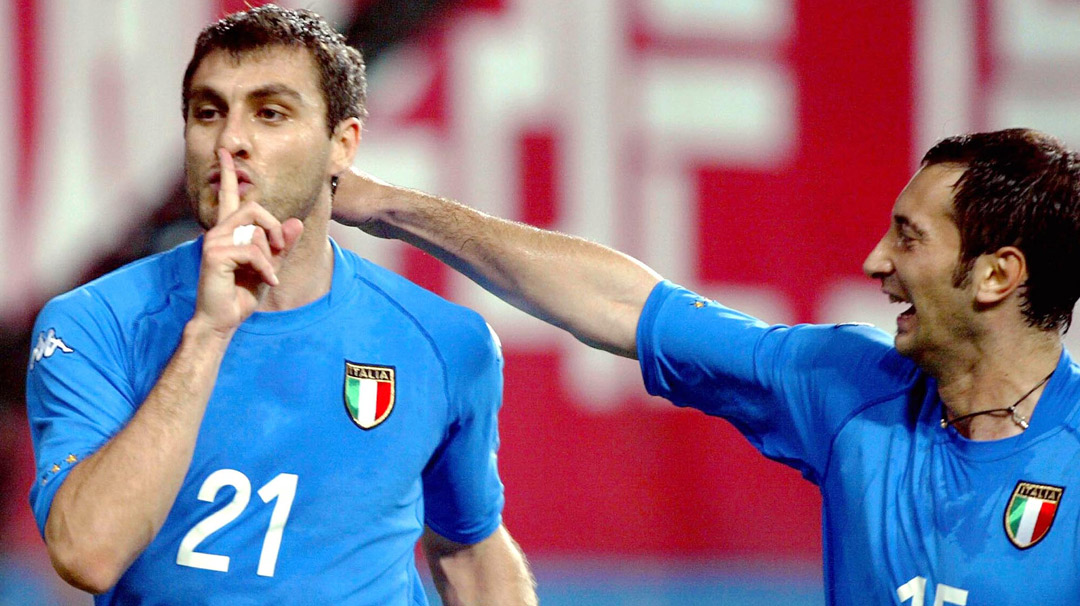
Italy were without both centre-backs, with Nesta injured and Cannavaro suspended, but despite conceding a fourth-minute penalty which Buffon pawed away, they took what seemed an inevitable lead via Vieri's head on 18 minutes. That should have been that. South Korea were unbowed and pushed energetically for an equaliser, but it seemed like it would never come. Then, two minutes from the end, Seol Ki-hyeon forced the ball home after Christian Panucci stumbled over his own incompetence.
South Korea had their equaliser and the world had sudden-death extra time. Piqued, the Italians pushed on for the winner they still thought would be theirs, but they were undone again just three minutes away from a penalty shootout when the diminutive Ahn Jung-hwan rose high(ish) above the leaden-footed Paolo Maldini to head past Buffon. The Italians had no right of reply and found themselves eliminated for a second time by a Korea, at which point a reported three million people flooded the streets of Seoul in delirious disbelief.
Italy's reaction was obviously less euphoric. 'LADRI' screamed the front page of Corriere dello Sport the next morning, translated as: 'THIEVES'. “Italy has been thrown out of a dirty World Cup where referees and linesmen are used as hitmen,” seethed CorrieredellaSera, with more than a little justification. Twice in extra time, Italy had appeared to fall foul of questionable interpretation of the rules by the referee, the Ecuadorian whistle-blower Byron Moreno.
Appearing unable to keep up with the brisk pace of the game, Moreno had shown a hardline red to Totti for simulation, despite the Italian being fouled and despite the official wheezing hard some distance behind the incident.
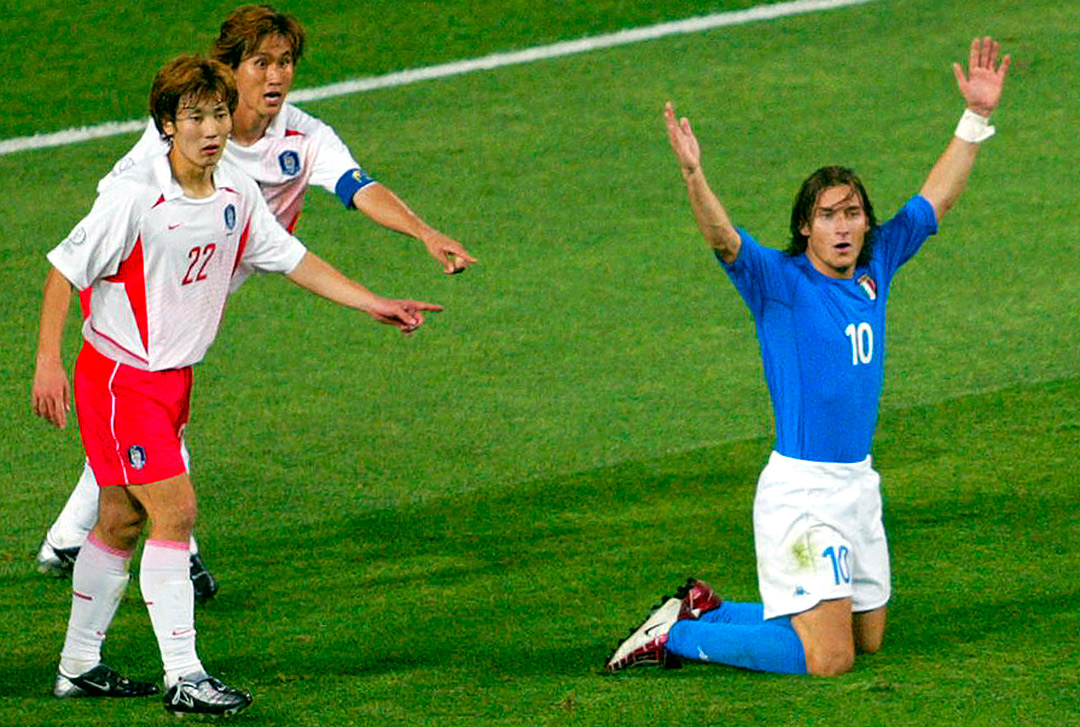
Almost immediately, Italian grievances doubled when Damiano Tommasi was flagged offside when clean through on goal, again with little justification. “No other team in the entire history of the World Cup has suffered so many injustices,” raged a typically emotional CorrieredellaSera, which seemed like a measured reaction when compared to that of Perugia chairman Luciano Gaucci. With smoke billowing from either ear and both knees jerking wildly in the wind, Gaucci had turned on goalscorer Ahn, an employee of his club.
"That gentleman will never set foot in Perugia again," he raged, tearing up his contract of employment. "I have no intention of paying a salary to someone who has ruined Italian soccer."
The whole of South Korea really couldn't have cared less. They were too busy celebrating one of the World Cup's greatest shocks to worry too much about Italian accusations. And besides, they had a quarter-final against Spain to prepare for in four days' time.
A Spanish inquisition
Now, what South Korea could really have done with after the suspicion that hung heavy over the Italy game was a nice, clean, honest result played entirely by the book. Unfortunately – for Spain at least – it didn't quite pan out that way. Twice they were denied what looked like perfectly good goals; Ruben Baraja's header on 50 minutes scratched for supposed pushing, and Fernando Morientes's header ruled out for the ball having already gone out of play on 92 minutes.
Throughout the encounter, according to the Spanish argument, the two linesmen had put paid to La Roja building up any kind of momentum by waving their flags at every opportunity. Morientes again came close to winning it in extra time, watching his effort rebound off the post, but South Korea hung on for penalties where they kept their heads and won 5-3.
Having led a very irate-looking Spanish inquisition in the direction of the Egyptian referee and his Ugandan and Trinidadian assistants, Ivan Helguera later explained why he had become so animated. "Everyone saw two perfectly good goals," he seethed, his face the shade of Spain's jersey. "If Spain didn't win it's because they didn't let us win."
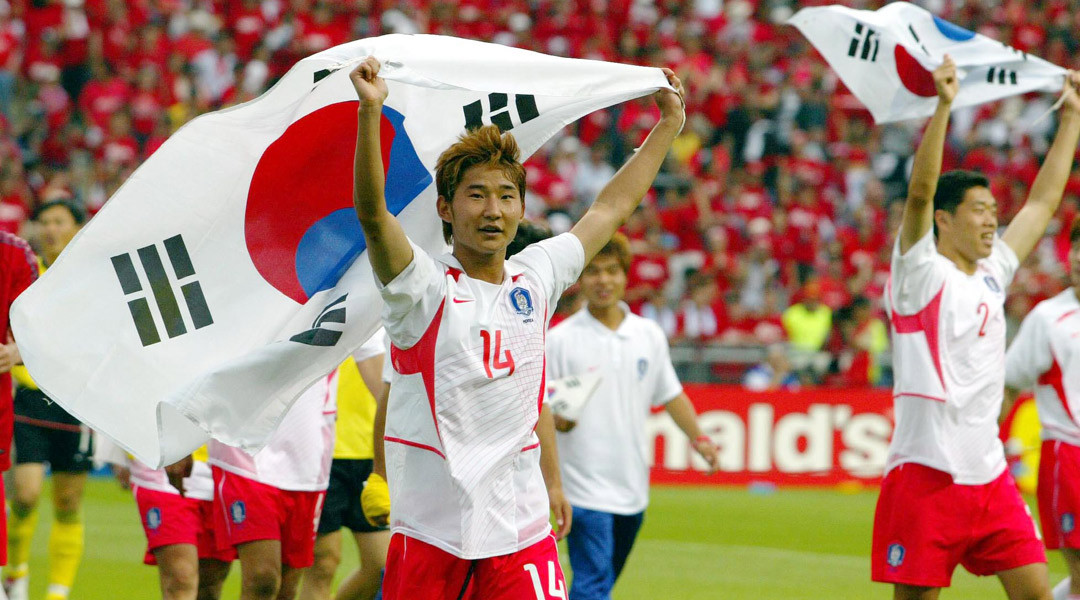
But again, South Korea didn't much care – particularly not Guus Hiddink. "The losing team must look in the mirror," he shrugged. "If an experienced team doesn't take advantage of the mistakes we made, they shouldn't look at external circumstances... more dreams have come true."
Sadly, not all dreams end happily, and so it proved for South Korea. In the semi-final, with typical ruthlessness, Germany finally snuffed out the underdogs' dream as Michael Ballack scored the only goal with 15 minutes remaining.
We should probably have seen this coming: they'd earlier raised a middle finger to romance by putting eight past Saudi Arabia. In the other semi-final, Brazil beat Turkey by another goal to nil, setting up the type of heavyweight final that every World Cup requires. The dream was finally over, yet the memory – as strange and suspicious as it was – will live long.

